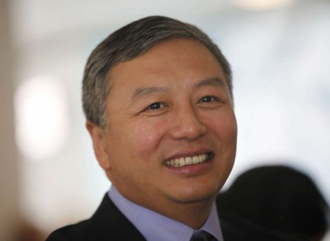China-Japan Joint Venture to Make Saab Electric Cars
Saab's Green Savior: Johan Jiang may have the government ties needed to turn Saab into a thriving money-loser.
The Chinese bio-energy entrepreneur who engineered the purchase of Swedish carmaker Saab out of bankruptcy last week hopes to use the Saab brand to produce electric cars in China as early as late next year.
Johan Kai Jiang, CEO of National Electric Vehicle Sweden (NEVS), hopes to manufacture electric cars in China using Japanese technology and the Saab brand which his firm purchased on June 13 for about 1.8 kronor ($256 mil.), according to the Beijing-based weekly Economic Observer.
What NEVS bought from Saab is rather limited: the production facility, Saab Tools, test facilities and the powertrain and intellectual property rights to the Saab 9-3, an older model that does not use any GM technology like the newer 9-5 and 9-4X models.
“We have no interest in the 9-5 or 9-4X,” Jiang told the press on June 13 at the time NEVS made the purchase. “Reason is that GM has no interest to sell the rights. Our interest is in 9-3.”
Jiang formed National Electric Vehicle Sweden to acquire Saab as a joint venture between his Hong Kong-based renewable energy power plant builder National Bio Energy Group (NBE) and Japanese investment firm Sun Investment.
NBE is the world’s largest renewable-energy producer, providing 60% of the bio energy produced in China, according to Economic Observer. NBE has assets of 13.7 billion yuan ($2.16 billion).
Jiang once worked as a clerk at various state banks, including the People’s Bank of China. He founded NBE in 2004 together with State Grid to produce bio energy with technology developed by the Danish firm Bioener. NBE bought Bioener in 2009.
Jiang plans to use Saab’s 9-3 chassis and body for the electric car he hopes to debut in 2013 or 2014.
Saab suffered financial crisis in early 2011 when it ran out of cash to pay its suppliers and workers, forcing it to file for bankruptcy protection. Several Chinese buyers had emerged but GM, which had recently owned Saab, refused to license its automotive technology to any Chinese buyer for fear it would interfere with its highly profitable China joint venture with SAIC.
Most industry observers are skeptical that Jiang will be able to turn a perennial money-losing brand like Saab into a moneymaker by combining it with an auto segment that remains a money-losing niche that can only survive on government subsidies.
What they’re leaving out of the calculation is the fact that China’s central government has signaled that it is anxious to pour many billions of yuan to stimulate its economy and that it is willing to pour more billions into the crusade to improve the air quality in its major cities by turning to green energy sources. Jiang has already shown himself to be well connected to high government officials by building a bio-energy behemoth without ever turning a profit. From that standpoint, Jiang may well be the only entrepreneur equipped to save the Saab brand.

The Chinese bio-energy entrepreneur who engineered the purchase of Swedish carmaker Saab out of bankruptcy last week hopes to use the Saab brand to produce electric cars in China as early as late next year.

